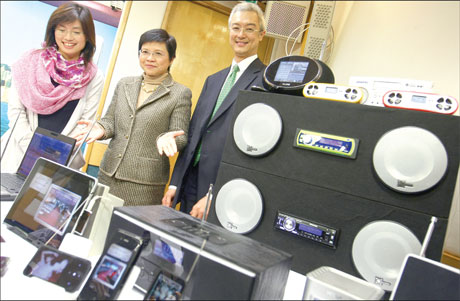City to have digital audio broadcasting by mid-2012
Updated: 2010-11-06 06:25
By Guo Jiaxue and Ming Yeung(HK Edition)
|
|||||||||
|
Secretary for Commerce and Economic Development Rita Lau (2nd left) tells reporters about some of the digital radio receiving devices available in the market at a press conference held to announce the government's DAB licensing decision in Hong Kong Friday. Provided to China Daily |
Government grants in principle licenses to three operators of DAB services
If everything goes as planned, three operators of digital audio broadcasting (DAB) are expected to begin airing regular programs on this modern platform known for much better sound and greater stability as well as richer content than the present analog radio formats (AM and FM) can offer in Hong Kong by the middle of 2012.
The government announced on Friday it has in principle approved the applications by three local broadcasters for 12-year DAB service licences.
They are Wave Media, Phoenix U and an existing operator, Metro, which plan to offer a total of 13 channels among them.
Wave Media will run seven channels, including 24-hour news, lifestyle, community and, of course, music. Programs broadcast in foreign languages, really not limited to English, will also be produced for non-Chinese listeners.
The other two operators will open three channels each, with Phoenix U saying its programs, including music, financial news and current affairs of Hong Kong and Guangzhou, will all be presented in Mandarin.
The combined investment of the three radio operators will be around HK$1 billion in the first six years.
"We expect that DAB services will be launched within 18 months of the grant of licences; that is sometime before mid-2012," Secretary for Commerce and Economic Development Rita Lau said at a press conference on Friday.
In addition, RTHK will offer five DAB channels around the same time. Details will be announced in the near future.
Businessman Albert Cheng Jing-han, chairman of Wave Media, widely known as "Tai-pan", called on all three operators to work together to promote digital radio.
"This will bring more program choice to the public, and foster market competition," Lau said.
Lawmaker in information technology sector Samson Tam Wai-ho hoped that the three broadcasting companies would fund transport operators such as minibuses or taxis to install receivers to promote digital channels.
The popular AM/FM audio systems cannot receive digital audio broadcast, which means listeners will have to cough up HK$500 to HK$1,000 for a digital audio receiver. USB receivers can also be obtained to get digital channels on lap-tops and other portable devices.
Digital audio receivers are expensive for a reason, Lau explained. Apart from MP3-quality stereo sound, the receivers also display text information and images related to the audio content.
For example, while listening to music, one can read information about the piece and featured artists, including lyrics, photos and album covers, Lau added.
Details of the audio broadcasting licences, including the terms and conditions for operator compliance, will be prepared and submitted soon to the Chief Executive in Council for approval.
With representatives from the Television and Entertainment Licensing Authority, the Office of the Telecommunications Authority, RTHK and the three prospective licensees, a DAB Steering Committee is going to be set up. The organization will promote DAB services in Hong Kong, including public awareness and knowledge campaigns, take-up rate monitoring and network rollout.
China Daily
(HK Edition 11/06/2010 page1)
